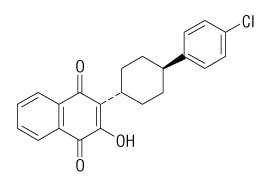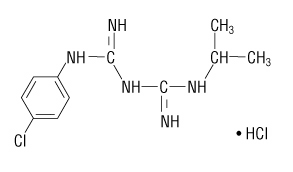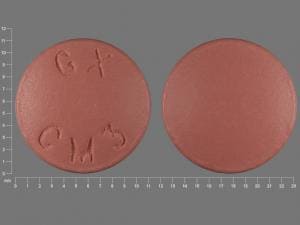Malarone
Generic name: atovaquone and proguanil
Brand names: Malarone, Malarone Pediatric
Drug class: Antimalarial combinations
Medically reviewed by A Ras MD.
What is Malarone used for?
Malarone is a prescription medicine that is used to treat or prevent malaria.
Description
MALARONE (atovaquone and proguanil hydrochloride) tablets (adult strength) and MALARONE (atovaquone and proguanil hydrochloride) pediatric tablets, for oral administration, contain a fixed‑dose combination of the antimalarial agents atovaquone and proguanil hydrochloride.
The chemical name of atovaquone is trans-2-[4-(4-chlorophenyl)cyclohexyl]-3-hydroxy-1,4-naphthalenedione. Atovaquone is a yellow crystalline solid that is practically insoluble in water. It has a molecular weight of 366.84 and the molecular formula C22H19ClO3. The compound has the following structural formula:

The chemical name of proguanil hydrochloride is 1-(4-chlorophenyl)-5-isopropyl-biguanide hydrochloride. Proguanil hydrochloride is a white crystalline solid that is sparingly soluble in water. It has a molecular weight of 290.22 and the molecular formula C11H16ClN5•HCl. The compound has the following structural formula:

Each MALARONE tablet (adult strength) contains 250 mg of atovaquone and 100 mg of proguanil hydrochloride and each MALARONE pediatric tablet contains 62.5 mg of atovaquone and 25 mg of proguanil hydrochloride. The inactive ingredients in both tablets are low-substituted hydroxypropyl cellulose, magnesium stearate, microcrystalline cellulose, poloxamer 188, povidone K30, and sodium starch glycolate. The tablet coating contains hypromellose, polyethylene glycol 400, polyethylene glycol 8000, red iron oxide, and titanium dioxide.
Before taking Malarone, tell your doctor:
- If you are allergic to Malarone; any part of this medicine; or any other drugs, foods, or substances. Tell your doctor about the allergy and what signs you had.
- If you have kidney problems.
- If you are taking any of these drugs: Rifabutin or rifampin.
This is not a list of all drugs or health problems that interact with this medicine.
Tell your doctor and pharmacist about all of your drugs (prescription or OTC, natural products, vitamins) and health problems. You must check to make sure that it is safe for you to take Malarone with all of your drugs and health problems. Do not start, stop, or change the dose of any drug without checking with your doctor.
What are some things I need to know or do while I take Malarone?
For all uses of Malarone:
- Tell all of your health care providers that you take Malarone. This includes your doctors, nurses, pharmacists, and dentists.
- Liver problems have happened with Malarone. Sometimes these problems have been severe, leading to liver transplant or death. Liver problems may happen in people with or without liver disease. Talk with the doctor.
- If you are throwing up or have diarrhea, Malarone may not work as well. Talk with your doctor.
- Tell your doctor if you are pregnant, plan on getting pregnant, or are breast-feeding. You will need to talk about the benefits and risks to you and the baby.
Preventing malaria:
- Other measures are needed along with Malarone including using screens, bed netting, insect repellent (10% to 35% DEET), and permethrin spray on clothing and nets. Avoid spraying most insect repellents on children. Lower evening and night-time outdoor activity.
- If you are a pregnant woman and traveling to a malaria infested place, talk to your doctor about the risks first.
How is Malarone best taken?
Use Malarone as ordered by your doctor. Read all information given to you. Follow all instructions closely.
For all uses of Malarone:
- Take Malarone at the same time of day.
- Take with food or a milky drink.
- Keep taking Malarone as you have been told by your doctor or other health care provider, even if you feel well.
- If you throw up within 1 hour of taking Malarone, take 1 more dose.
- You may crush the tablet and mix it with condensed milk.
- After mixing, take your dose right away. Do not store for future use.
Preventing malaria:
- Use as you have been told to prevent malaria.
- If using to prevent malaria, start Malarone before traveling to the high risk place.
What do I do if I miss a dose?
- Take a missed dose as soon as you think about it.
- If it is close to the time for your next dose, skip the missed dose and go back to your normal time.
- Do not take 2 doses at the same time or extra doses.
What are the side effects of Malarone that I need to call my doctor about immediately?
WARNING/CAUTION: Even though it may be rare, some people may have very bad and sometimes deadly side effects when taking a drug. Tell your doctor or get medical help right away if you have any of the following signs or symptoms that may be related to a very bad side effect:
For all uses of Malarone:
- Signs of an allergic reaction, like rash; hives; itching; red, swollen, blistered, or peeling skin with or without fever; wheezing; tightness in the chest or throat; trouble breathing, swallowing, or talking; unusual hoarseness; or swelling of the mouth, face, lips, tongue, or throat.
- Signs of liver problems like dark urine, feeling tired, not hungry, upset stomach or stomach pain, light-colored stools, throwing up, or yellow skin or eyes.
- Strange or odd dreams.
- A very bad skin reaction (Stevens-Johnson syndrome/toxic epidermal necrolysis) may happen. It can cause very bad health problems that may not go away, and sometimes death. Get medical help right away if you have signs like red, swollen, blistered, or peeling skin (with or without fever); red or irritated eyes; or sores in your mouth, throat, nose, or eyes.
Preventing malaria:
- Fever that happens while in or after coming back from the malaria area.
What are some other side effects of Malarone?
All drugs may cause side effects. However, many people have no side effects or only have minor side effects. Call your doctor or get medical help if any of these side effects or any other side effects bother you or do not go away:
- Headache.
- Cough.
- Stomach pain or diarrhea.
- Upset stomach or throwing up.
- Not hungry.
- Feeling tired or weak.
- Dizziness.
These are not all of the side effects that may occur. If you have questions about side effects, call your doctor. Call your doctor for medical advice about side effects.
You may report side effects to the FDA at 1-800-332-1088. You may also report side effects at https://www.fda.gov/medwatch.
If overdose is suspected:
If you think there has been an overdose, call your poison control center or get medical care right away. Be ready to tell or show what was taken, how much, and when it happened.
How do I store and/or throw out Malarone?
- Store at room temperature.
- Store in a dry place. Do not store in a bathroom.
- Keep all drugs in a safe place. Keep all drugs out of the reach of children and pets.
- Throw away unused or expired drugs. Do not flush down a toilet or pour down a drain unless you are told to do so. Check with your pharmacist if you have questions about the best way to throw out drugs. There may be drug take-back programs in your area.
Label
PRINCIPAL DISPLAY PANEL
- NDC 0173-0675-01
- MALARONE
- (atovaquone and proguanil HCl)
- Tablets
- Each tablet contains 250 mg atovaquone and 100 mg proguanil HCl.
- Rx only
- 100 Tablets
- See accompanying prescribing information for Dosage and Administration.
- Store at 25oC (77oF); excursions permitted to 15o to 30oC (59o to 86oF) (see USP Controlled Room Temperature).
- Do not use if printed safety seal under cap is broken or missing.
- Trademarks owned or licensed by GSK.
- Distributed by:
- GlaxoSmithKline
- RTP, NC 27709
- Made in Canada
- ©2020 GSK or licensor.
- Rev. 01/21
- A059145 (62000000059145)


SRC: NLM .
